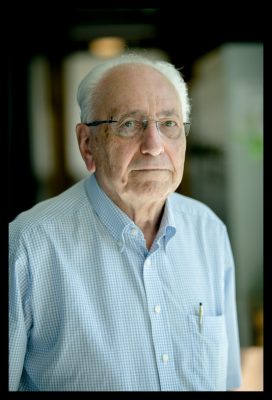Attila Fonyó was born in 1927 in Budapest. He spent his childhood in Újpest. Between 1945 and 1951, he studied general medicine at the Faculty of Medicine of Pázmány Péter University, the predecessor of Semmelweis University, where he graduated with a general medical degree in 1951. In 1949, he joined the Department of Physiology as a demonstrator, where he continued his scientific career as a graduate physician from 1951.
Between 1959-1981 he was a member of the former Clinical Experimental Research Laboratory and the Department of Physiology II. He was awarded the degree of Candidate of Medical Sciences in 1962 and Doctor of Medical Sciences in 1972. He returned to the Department of Physiology in 1981 as Director of the department, which he headed until 1995. Since 1997, he has been Professor Emeritus of the department.
His scientific specialization was at the interface of biochemistry and cell biology, exploring the mechanisms of mitochondrial transport processes and bioenergetics. He has made fundamental observations on mitochondrial transport processes, which have contributed significantly to the understanding of mitochondrial oxidation and Mitchell’s chemiosmotic processes. His scientific approach was dominated by the quest to understand cellular and molecular processes, but – as a member of a medical dynasty and based on his own diagnostic experience – he was also interested in the practical aspects of medicine.
He paid special attention to the introduction of modern scientific and educational approaches in Hungary, to the enforcement of the highest professional standards in medical education, to the expansion of international relations between the University and the Department of Physiology, to the support of the development of young researchers, and to the promotion of the international recognition of Hungarian medicine. His school-changing activities are reflected in the fact that more than a dozen of his direct and indirect students are currently leading outstanding national or international (mainly North American) research groups. Three of them are members of the Hungarian Academy of Sciences and five have been awarded funding from the Hungarian Academy of Sciences’ Lendület programme.
As director of the department, he promoted the development of a cellular and molecular physiology approach, the involvement of young, talented researchers, and the creation of an open and friendly intellectual workshop. He is credited with the introduction of modern cellular and molecular physiology education in Hungary. His work has laid the foundations for the success of the Department of Physiology in recent decades. At the end of his tenure as Director, he embarked on another major undertaking: to pool his knowledge and experience to write a new textbook on physiology in Hungarian. “The Textbook of Medical Physiology”, which has already gone through eight editions, has been published in English and revised for pharmacy students, and has since become the definitive source of theoretical training for medical students. His teaching and research have shaped the theoretical medical knowledge and approach of generations of doctors.
He was Dean of the Faculty of Medicine (ÁOK) from 1985-1991. During this period he initiated fundamental reforms in the life of the faculty and the university.
One of the most important parts of his university activities was the launch of the German-language medical training programme in 1983 and its management for ten years. Building on the success and experience of the German-language training, the English-language medical training was launched a few years later. His work was recognized by the fact that he was awarded the Grand Cross of the Order of Merit of the Federal Republic of Germany in 1989.
Through his teaching and research activities and his strategic innovations, Attila Fonyó has become one of the most influential figures in the operation of Semmelweis University and in the training of doctors in Hungary in recent decades.
Attila Mócsai, Director, Department of Physiology


